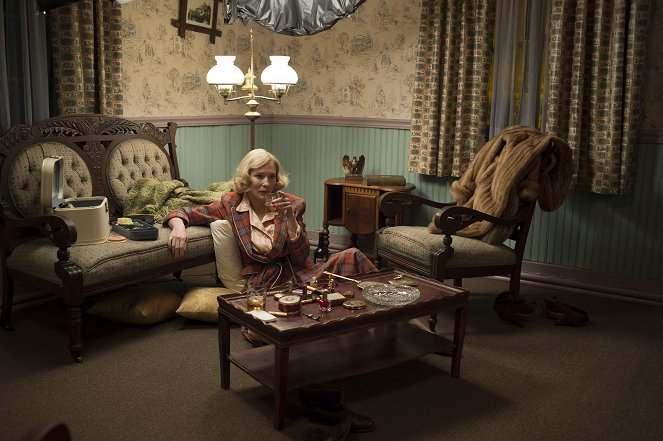Regie:
Todd HaynesDrehbuch:
Phyllis NagyKamera:
Edward LachmanMusik:
Carter BurwellBesetzung:
Cate Blanchett, Rooney Mara, Kyle Chandler, Jake Lacy, Sarah Paulson, Cory Michael Smith, Carrie Brownstein, John Magaro, Ken Strunk (mehr)Streaming (4)
Inhalte(1)
Im New York der 1950er-Jahre führt Carol (Cate Blanchett) eine unerfüllte Ehe mit ihrem wohlhabenden Mann Harge (Kyle Chandler). Sie lernt die junge Therese (Rooney Mara) kennen, die in einem Kaufhaus arbeitet und von einem besseren Leben träumt. Auf einer gemeinsamen Reise entwickelt sich eine ganz besondere Bindung zwischen ihnen – und schließlich die große Liebe. Harge will das neue Glück seiner Frau jedoch nicht akzeptieren und beginnt, entscheidende Beweise für das laufende Scheidungsverfahren zu sammeln. Carol muss schon bald um das Sorgerecht ihrer geliebten Tochter kämpfen. Ihr Mann versucht es ihr mit allen Mitteln zu nehmen. (DCM)
(mehr)Videos (25)
Kritiken (7)
Filmchallenge in Quarantäne - Lieblingsschauspielerinnen, Rooney Mara. Unbewusst habe ich im Rahmen meiner Challenge das Schwesternduell Kate Mara vs. Rooney Mara in Filmen mit Lesbenthematik geschaffen. Und eindeutig siegt Kate Mara. Rooney spielt zwar in Carol hervorragend, doch der Film hat die Tendenz, in zu viel Langsamkeit, Umständlichkeit und Langeweile abzugleiten. Einige lange Sequenzen haben ihre Bedeutung und schaffen die richtige Atmosphäre, doch anderswo ertrinkt der Film in Überflüssigem. Neben Rooney spielt natürlich auch noch Cate Blanchett toll, in ihrer Rolle ist sie mehr als genau.
()
Eine schöne Kamera und Musik. Die Geschichte der zwei Hauptdarstellerinnen ist aber psychologisch und sexuell schrecklich LANGWEILIG. Wie ein Beobachten vom Sonnenuntergang durch eine perfekt polierte Plastikfolie. Auf furchtbaren Holzsitzen im Prager Gemeindehaus (das Opening von einem Filmfestival) war es eine Qual.
()
Starke schauspielerische Leistungen, meisterhaft inszeniert und geschrieben, doch meiner Ansicht nach gehört dies in die Kategorie des vorhersehbaren queer-Dramas mit allem, einschließlich der enorm vorlagenbezogenen Emotionen. Ein modellhaftes amerikanisches Melodrama, dem verdientermaßen schauspielerische Preise verliehen werden, jedoch auch ein Film, der lediglich mit einer Durchführungsbravour endet. Kalt, leicht zu vergessen, überkultiviert - zumindest so hat das Ganze auf mich beim diesjährigen Wettbewerb in Cannes gewirkt.
()
In terms of style, Carol is perhaps Todd Haynes’s "straightest" film. Far From Heaven was rather more a meta-commentary on Douglas Sirk’s melodramas than a pure, absorbing and universal love story. In my opinion, Carol is a mature work by a director with a sense of humility toward both the story the and actresses depicting who doesn’t need to prove anything to himself or the audience (yes, I’m looking at you, Alejandro). With its purifying simplicity, behind which you feel the long consideration put into every shot, it reminded me of Lean’s Brief Encounter. In Carol, we also begin with one of the last scenes (which we see from a completely different perspective at the end), the points of view of the two lovers are also taken into equal consideration and their love is of the forbidden, socially unacceptable kind. However, the protagonists have to hide their emotions even more cautiously than the lovers in Lean’s film. Their relationship is perceived as obscene not only morally, but also legally, which enriches the narrative with the elements of a crime story. Therese and Carol must limit their interactions to fleeting touches, timid glances into each other’s eyes and outwardly innocent conversation. Their position in the shot, the settings in which they find themselves, the objects that complement them (or prevent us from seeing them better) often reveal more to us. This is probably why many find the film academically cold and detached. I would rather choose the words “subtle” and “restrained” – the film is not built on grand emotions and contrived plot twists, but on the small gestures and glances through which Carol and Therese communicate with each other, for lack of any other vocabulary, to the point where they can no longer return to their previous identities and no longer pretend to be someone else. Thanks to what is felt but not expressed, the film does not lack a dramatic or erotic tension, which would be unattainable with greater explicitness. In the search for relationship balance, Haynes meaningfully combines several minor motifs (the car ride, a symbol of the protagonists’ enclosed microcosm and their unfulfilled desire for freedom, security and gaining power over perspective and representation through photography) and supporting characters, not one of which ultimately gives Carol and Therese an excuse to verbalise their feelings. Like The Duke of Burgundy, Carol is not only about a lesbian relationship. Probably everyone who has ever been in love has experienced the same uncertainty about how to express feelings for which they don’t have words. 85%
()
Carol is a movie that’s based solely on the acting performances of Cate Blanchett and Rooney Mara. They both act exactly the way they need to. Cate is beautiful, dominant and exactly knows what she wants. Rooney is beautiful, quiet and her there’s a battle going on in her heart. But if it weren’t for one faint mention of the Czech Republic, there wouldn’t really be any significant reason for me to listen to the dialogues.
()
Galerie (144)
Photo © The Weinstein Company / Wilson Webb



Werbung